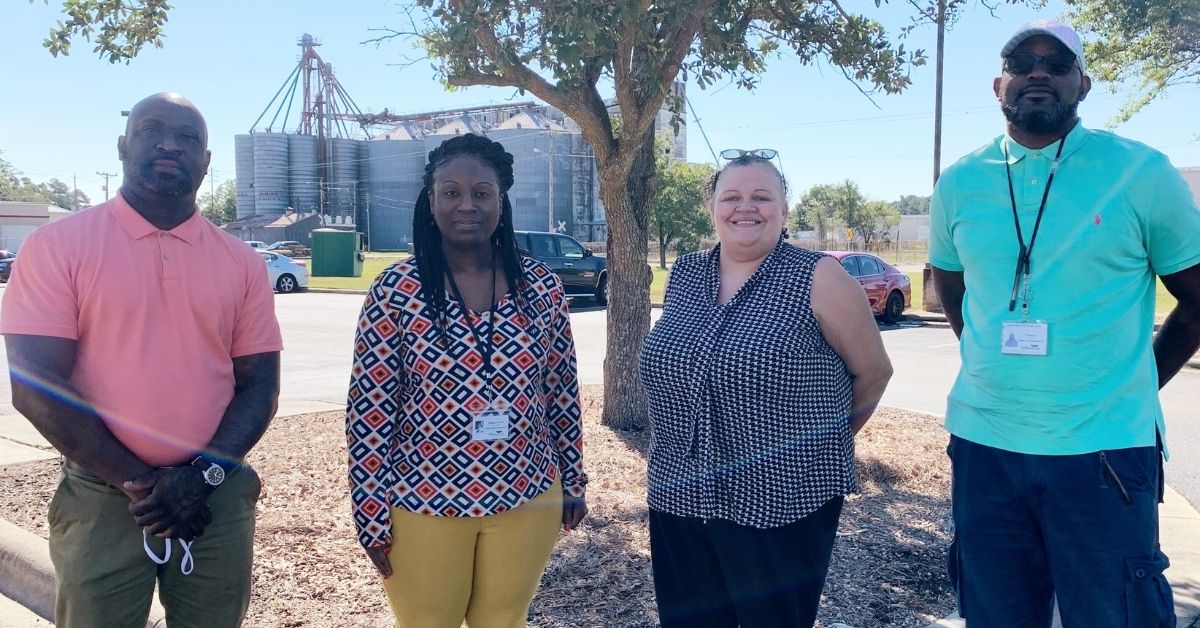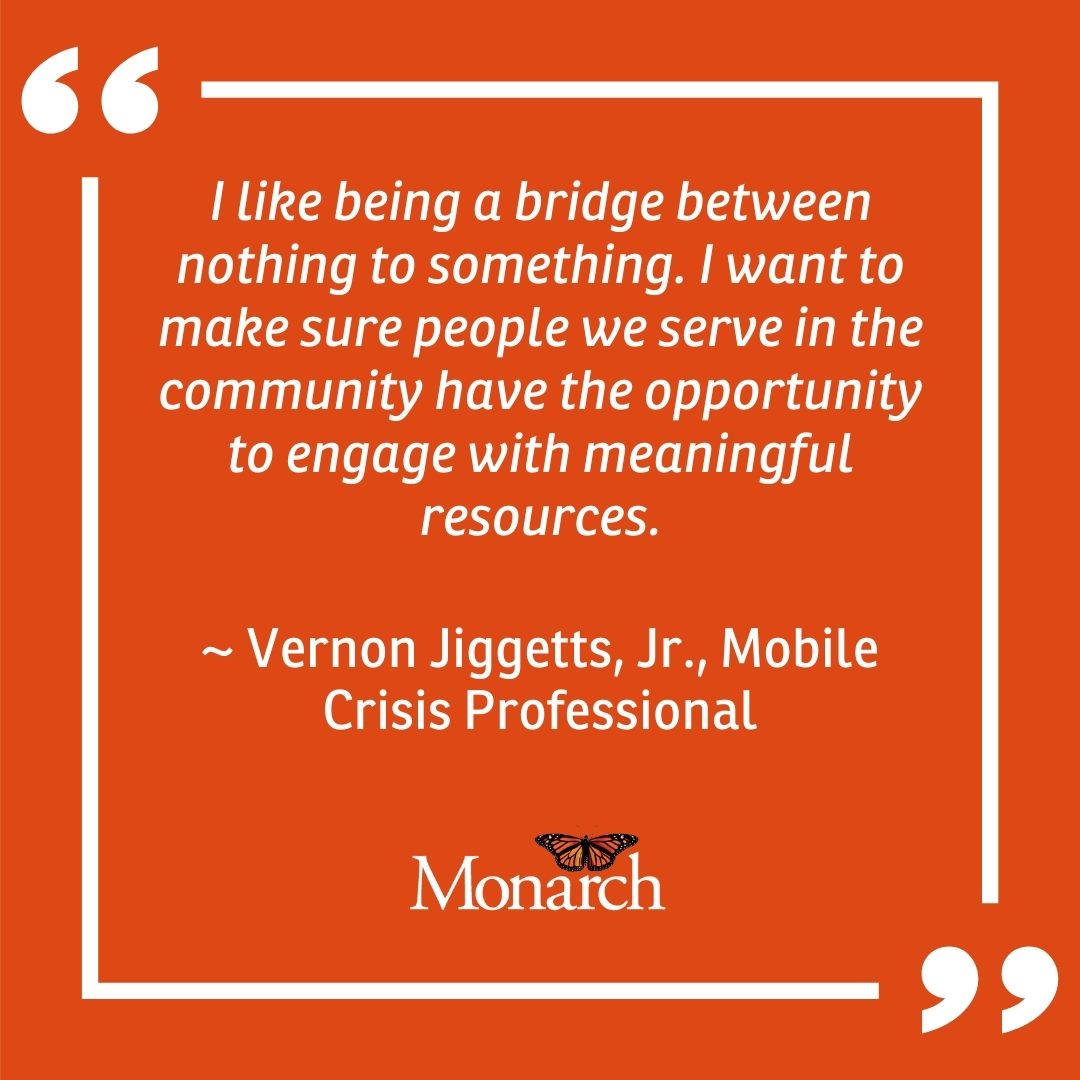Mobile Crisis Team On Hand to Assist People in Mental Health Crisis

Members of Monarch’s Lumberton-based Mobile Crisis team photo include (left to right) Rogelio Lynch, Markeisha Munn-Shaw, Tonia Locklear and Vernon Jiggetts, Jr.
Despite the restrictions and safeguards in place during the pandemic lockdown in 2020, residents of Bladen, Columbus, Robeson and Scotland counties could count on critical mental health services from Monarch’s Mobile Crisis Management – 24 hours a day, seven days a week.
“We still went out and did face-to-face visits during the lockdown,” said Mobile Crisis Team Leader Tonia Locklear. “We wear masks and gloves and used hand sanitizer.”
Mobile Crisis management consists of five team members supporting, serving and treating people who are experiencing an acute mental health or substance use disorder crisis. The team includes Locklear, Rogelio Lynch, Markeisha Munn-Shaw, Vernon Jiggetts, Jr., and Falon Pope.
Mobile Crisis responders meet people where they are in the community and provide an immediate evaluation, triage and access to mental health care resources. They respond to calls from people with intellectual and developmental disabilities (I/DD), mental illness or substance use disorders. Their goal is to reduce the level of crisis symptoms a person may be experiencing and reduce the likelihood they may harm themselves or someone else. They also transition people experiencing an acute crisis to appropriate stabilization and/or detoxification services.
Calls come from people struggling with severe depression, suicidal thoughts, the effects of alcohol and drugs, or domestic concerns, among other issues.
Throughout the pandemic, mobile crisis services were labeled essential and Monarch staff continued to provide direct care to individuals in the community who needed them most. Monarch’s mobile crisis team responded to 56 calls while most people were under stay-at-home orders. During 2020 and before vaccines were available, mobile crisis workers were among the frontline heroes, responding to 423 incidents overall.
Jiggetts, a Mobile C risis professional III who has worked at Monarch for more than two years, explained that it has been difficult to navigate COVID-19 while providing Mobile Crisis services, but he enjoys connecting people to services. “I like being a bridge between nothing to something. I want to make sure people we serve in the community have the opportunity to engage with meaningful resources,” he shared.
risis professional III who has worked at Monarch for more than two years, explained that it has been difficult to navigate COVID-19 while providing Mobile Crisis services, but he enjoys connecting people to services. “I like being a bridge between nothing to something. I want to make sure people we serve in the community have the opportunity to engage with meaningful resources,” he shared.
Mobile Crisis staff is accustomed to delivering services in a variety of locales. A typical call might take mobile crisis team members to a fast-food restaurant, a person’s home, a school, or even under a bridge, he said.
“A lot of people didn’t want us in their homes,” he recalled of the pandemic’s early days. “On a lot of calls, we were standing outside talking to individuals.”
Falon Pope, Mobile Crisis professional V, has worked at Monarch for more than nine years. “It was scary,” Pope recalled. “The whole world is fighting something that we cannot see. It was very scary to come back out. It was a constant roller coaster for months and I don’t think it eased up until you saw other people get back into the swing of things.”
Mobile Crisis has responded to 282 calls by mid-year 2021. At the same point last year, they had responded to 307. Unfortunately, Mobile Crisis services also receives a number of calls from schools and with schools opening back up soon, those school calls have started to rise again.
“Yes, our call volume picked back up since school began,” Locklear says. “We are being utilized by the school systems. Usually, the school counselors or social workers call us after they have encountered a child who is dealing with some suicidal behaviors, thoughts or even homicidal thoughts or intent. We had a couple of assessments that we had to deal with hate crimes and make sure people are not trying to harm others. We also assess kids who are being bullied or have depression or anxiety symptoms.”
Locklear said safeguards and processes remain in place as the pandemic continues. Monarch Crisis staff like other health care providers, are careful not to let their guard down taking appropriate safety measures in all situations, especially as variants of the COVID-19 virus emerge.
“I don’t think we’ll ever be used to it,” Locklear said. “We’re still being extremely cautious, still wearing a mask, especially with the Delta variant. We are still using hand sanitizer. It’s like toilet paper – you have to have it.”
For additional information about Monarch’s Mobile Crisis Management services, please visit the website or call (800) 913-6109.
Posted on: Wednesday October 27, 2021
